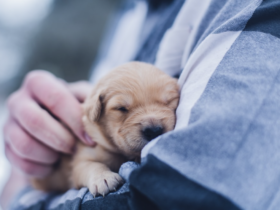If you’re lucky enough to call a cat your companion, it’s probably become second nature to share things like your bed, your couch, your lap, and even some of your food with your purring pal. But what if your cat wants to share your earwax? Is that pushing the boundaries of the relationship (and perhaps your gag reflex) a bit too far?
Foraging for earwax might seem like a bizarre pastime for your cat, but there are some surprisingly good reasons why the strange substance holds such appeal. And whether your cat is digging in the trash or directly in your ears, we have some advice for redirection.
2 Reasons Why Cats Eat Earwax
If your cat likes earwax, he’s not alone—nor is he irrational. In fact, there are two main reasons why you might have a literal cat burglar on the loose who’s after your cotton swabs or earlobes:
1. Earwax is part of your kitty’s diet.
Earwax (also called cerumen) is a waxy, protective oil produced by glands in the ear canal, which doesn’t exactly sound like prime kitty kibble competition. But in 1991, a team from the University of Toronto broke down the organic composition of earwax, which can help shed light on why it may be catching your cat’s attention. According to the results of their study, earwax contains, among other things, dead skin cells, fatty acids, and cholesterol.
These may not sound like the ingredients to a dish you’d like to order, but to your cat, they smell like survival. That’s because felines are obligate carnivores, meaning they must eat a diet of mainly meat to get the nutrients they need. Thus, the animal proteins in your earwax may have your cat saying “Bon appétit!” to the bits he finds in the bin and in your ears.
2. Earwax is part of your kitty’s love language.
If your cat’s earwax interests are localized to your lobes, the reason may have very little to do with the substance itself. Your cat may just be grooming you—not because you’re dirty but because he loves you.
“Allogrooming [i.e. grooming that takes place between members of the same species] is a common behavior among cats,” says Pam Johnson-Bennett, CCBC, author and owner of Cat Behavior Associates. “In an outdoor colony, grooming each other is a way to create a common communal scent for familiarity, as scent is one of the most important methods cats use for identification and recognition.” And when cats allogroom, she continues, they typically stick to the areas around the head.
But for some cats (specifically those who are bonded), the behavior goes beyond creating a communal scent, Johnson-Bennett explains. For bonded cats, allogrooming is a sign of affection. “I would guess that the majority of cats who groom their owners around the head and face, including the ears, are doing it as a sign of affection and not as a way to retrieve earwax,” Johnson-Bennett says.
So in other words, your cat sees you as not only another cat, but a cat with whom he’s bonded. Aww, shucks. What you thought was cringey is actually kind of cute (though we completely understand if you still prefer sonnets and flowers as signs of affection).
Is Human Earwax Bad for Cats?
The answer here is simple: No, human earwax is not harmful for cats to eat. The only thing this behavior is likely to hurt is your appetite.
How to Discourage Your Cat’s Earwax Obsession
Earwax itself may not be harmful to your cat, but if your cat won’t stay out of your waste bin, that’s a problem. “Getting into the trash is not safe for a cat under any circumstances because of objects such as dental floss, razor blades, and more,” Johnson-Bennett explains. And while your cat may be after the wax on your discarded cotton swabs, there’s a good chance some or all of that tool will end up in your kitty’s stomach.
“If your cat is determined to raid the trash in search of soiled ear swabs, make sure the bin has a locked cover or keep it enclosed in a cabinet,” Johnson-Bennett advises. And if your cat is crafty enough to master opening the cabinet door, she recommends installing an inexpensive but highly effective childproof latch.
If, instead, your cat is prone to allogrooming and is becoming exasperating rather than endearing, there’s something you can do about that, too. “For those cats obsessed with an owner’s ears, I recommend diverting attention toward more constructive activities like food-dispensing toys,” Johnson-Bennett advises. “There are many puzzle feeder toys on the market, and owners can find the right one that matches their cat’s ability.”
This sort of redirection is a great way to preserve the bond you have with your cat while also keeping your ears dry. Another fun option for diverting your cat’s tongue away from your face is the Lickimat. “There are several styles available,” Johnson-Bennett says, “and all the owner needs to do is spread a little wet cat food on the plastic mat.”




:max_bytes(150000):strip_icc()/why-do-cats-like-earwax-1158974273-2000-11869535a71049238888bc14f06caa8c.jpg)
:max_bytes(150000):strip_icc()/cats-watching-dominos-2000-18e59db31fa142839b7a677ddd36eb34.jpg)
:max_bytes(150000):strip_icc()/bedlington-terrier-lying-rug-1186353094-2000-0253d70f30a74f08a0b82354b0226d05.jpg)
:max_bytes(150000):strip_icc()/cat-shampoo-60faa26684d34026a9b482073b87d4c6.png)
:max_bytes(150000):strip_icc()/cat-trees-for-large-cats-2000-1ec2ca7fb1be49b78244096f5c2367b2.jpg)
:max_bytes(150000):strip_icc()/do-cats-cry-3-1370446355-2000-75d902230d36418d9ed8b43123b29481.jpg)
Leave a Reply
View Comments